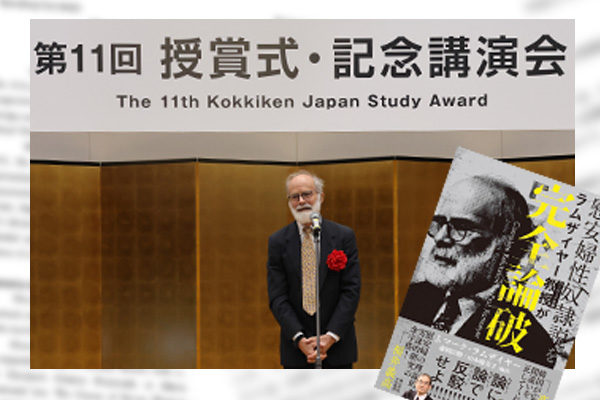On July 11, the Japan Institute for National Fundamentals (JINF) presented its Japan Study Award to Harvard University Professor John Mark Ramseyer who has published an academic paper debunking a theory still persists abroad that wartime comfort women were sex slaves and has been fighting virtually alone in the U.S. academia on the issue. The JINF also gave its Japan Study Special Award to Tokyo Metropolitan University Professor Emeritus Tei Taikin who has published studies that break away from the historical perception of Japan as a perpetrator and Korea as a victim.
Comfort women were indentured prostitutes
Ramseyer’s award-winning work is “Ianfu Seidorei Setsu wo Ramseyer Kyoju ga Kanzen Ronpa (Complete Refutation by Prof. Ramseyer: Comfort Women Were Not Sex Slaves)” (Heart Shuppan, December 2023), a compilation of his paper published in the academic journal International Review of Law and Economics (IRLE) and his responses to critics.
The theory prevalent in Western academia and the United Nations claims that during the war, many young women including underage girls were forcibly taken away from the Korean Peninsula, then under Japanese rule, sent to comfort stations for Japanese soldiers, and forced to engage in sexual acts as slaves. Ramseyer referred to a lot of Japanese-language literature and found that comfort women were like registered prostitutes who were then officially recognized whose impoverished parents signed indentured servitude contracts to receive money paid in advance for their daughters’ servitude as prostitutes. Many comfort women left the stations after they repaid the money or their contracts expired.
In early 2021 when a Japanese newspaper reported about Ramseyer’s IRLE thesis, however, historians in South Korea and the United States reacted fiercely and demanded the IRLE to retract the paper. Thousands of scholars are said to have supported the demand. Some emails even threatened to kill him. As for the reasons for the widespread backlash, Ramseyer said that few did read (or, in fact, could read) Japanese-language documents to understand the realities, and that suspicions about Japanese military’s involvement and sexual slavery have taken on a life of their own in a manner to cause a strong reaction from human rights advocates.
Left-wing biases in academia
Behind the strong backlash against the comfort women issue among university professors and historians in the U.S., some European countries, and South Korea are political biases, that are particularly pronounced in humanities departments of prestigious U.S. universities. According to a 2018 survey of political party support among professors at 51 humanities departments in the U.S., the gap between the parties was big: 10 Democrats to one Republican. Rather than ideological diversity, Ramseyer notes that in many cases there is an extreme bias to the left and a growing lack of tolerance for different views.
In 2014, the Asahi Shimbun newspaper corrected and apologized for comfort women reports, explaining that they were based on Seiji Yoshida’s false testimony that comfort women had been forcibly taken. The correction and apology might have been insufficient and failed to reach abroad, or have been ignored by those sticking to the biased sex slave theory.
Ramseyer was most disheartened when he found the names of those whom he had thought as close friends among the signatories calling for the retraction of his paper. He had sleepless nights. For that reason, he was grateful for the encouragement by other friends. He says he was able to stick to his credo of “refusing to retract what he thinks is right” thanks to the encouragement he received from friends in the U.S. and Japan. These words made us strongly feel the significance of the Japan Study Award presented to him by JINF.
Hironobu Ishikawa, formerly with the Yomiuri Shinbun, is a director and a Planning Committee member at the Japan Institute for National Fundamentals.


